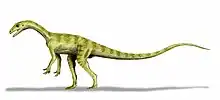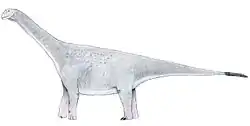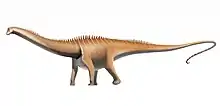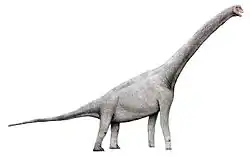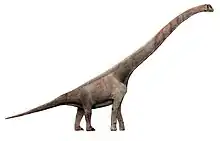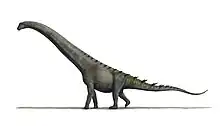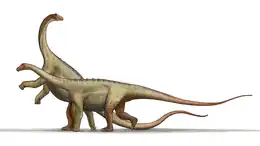| Ruehleia Temporal range: Norian ~ | |
|---|---|
 | |
| Neck vertebrae, Naturkunde Museum, Berlin | |
| Scientific classification | |
| Domain: | Eukaryota |
| Kingdom: | Animalia |
| Phylum: | Chordata |
| Clade: | Dinosauria |
| Clade: | Saurischia |
| Clade: | †Sauropodomorpha |
| Genus: | †Ruehleia Galton, 2001 |
| Species: | †R. bedheimensis |
| Binomial name | |
| †Ruehleia bedheimensis Galton, 2001 | |
Ruehleia is a genus of sauropodomorph dinosaur from the Late Triassic period of Germany. The type species is R. bedheimensis, described by Galton in 2001,[1] and is named for the German paleontologist Hugo Rühle von Lilienstern. Discovered in 1952, the holotype consists of one nearly complete skeleton, including cervical (neck), dorsal (back), and caudal (tail) vertebrae; a partial sacrum; a scapulocoracoid; pelvic bones; most limb bones; and a partially complete manus (hands).[2]

Vertebrae and ribs, Naturkunde Museum, Berlin
The fossils were found in central Germany and date to the Norian stage, around 216 to 208 million years ago.[1]
References
- 1 2 Galton, P.M. (2001). "Prosauropod dinosaurs from the Upper Triassic of Germany", In Colectivo Arqueologico-Paleontologico de Salas, C.A.S. (Eds.): Actas de las I Jornadas Internacionales sobre Paleontologia de Dinosaurios y su Entorno [Proceedings of the First International Symposium on Paleontology of Dinosaurs and Their Environment], 25–92.
- ↑
This article is issued from Wikipedia. The text is licensed under Creative Commons - Attribution - Sharealike. Additional terms may apply for the media files.
